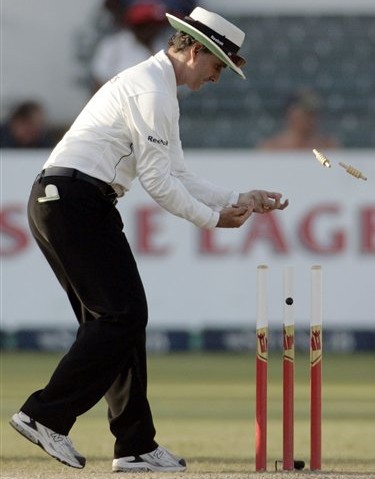It has been nearly six weeks since I brought you news of the shameful shenanigans and malevolent vengeance endangering India’s highly anticipated tour of South Africa – if you missed it the first time around have a look at How do you Like Them Crab Apples in the archive section.
There has been little to report since then aside from the deafening sounds of silence followed by an unnerving static of rumour and innuendo but, if recent media reports can be believed, it would appear that a deal to save the tour has finally been reached following a meeting between the BCCI’s infamous Narayanaswami Srinivasan and CSA’s Chairman, Chris Nenzani.
The reported tour of two Tests and either three T20I matches or three ODIs to be confirmed following the BCCI Board meeting on October 26 represents a financial disaster for CSA who stand to lose approximately $19.9m USD in revenue as a result of the shortened tour, but considerably less than the crippling $49.8m USD at risk had the tour not gone ahead at all.
Obviously cognisant of this financial catch-22, and perhaps even more acutely of the underlying reasons at the heart of the BCCI’s artfully crafted piece of bastardry, Nenzani extended more than an olive branch and a persuasive argument when he met Srinivasan last week in a desperate attempt to salvage the tour.
According to Cricinfo one of the conditions demanded in return for the tour proceeding was that the man at the centre of the enmity, Haroon Lorgat, have no part at all in it. However, once bitten and twice shy, Nenzani was also reported to have offered to “send Lorgat on long leave” and that CSA “would be working out a plan before the end of the tour to ensure Lorgat is not involved in future dealings with the BCCI”.
I suppose it isn’t quite the grovelling apology sought from a prostrate Haroon Lorgat, nor was it his complete removal, but it comes pretty close with Nenzani’s Faustian pact having more than a passing nod to ancient Greek history in its reintroduction of the practice of ostracism to high cricketing life.
Ostracism was introduced to ancient Athens in around 580BC as a response to almost a century of warring between rival noble families that saw murders and entire families being permanently banished from the city, leading in turn to a never-ending cycle of further retaliatory violence and counter expulsion.
At its heart ostracism transferred power from the noble families to the citizens of Athens who were given the power to decide who should go and who should stay via a vote whereby they would scratch the name of candidate for expulsion onto an ostracon or potsherd.
If a candidate received more than 6,000 votes they were asked to leave Athens for ten years, after which they could return, and to encourage them to accept the decision peacefully they were permitted to retain their property and any income accumulated from it.
The system provided a clever means of ending the never-ending cycle of conflict between the noble elites of the city but it did not take long for it to be abused for political advantage, so much so that anyone targeted could be ostracised, whether they were a threat to the peacefulness of the city or not. Themistocles, the city’s leader from 493BC, was particularly adept in using the process for political advantage and he successfully cast a number of prominent rivals from the city, only to finally receive a taste of his own medicine around 470BC.
Obviously Chris Nenzani forgot to read the last few pages and missed seeing how the story ended!
But people in South Africa’s cricketing fraternity are starting to notice, with journalist Telford Vice reporting of a schism emerging among the board of CSA over the Nenzani’s handling of the matter with five members against his ‘compromise’ and six in support, including the Chairman himself.
No doubt many are asking how their CEO can be an effective representative and agent for South African cricket when he has been withdrawn from ever dealing with cricket’s most powerful group, the BCCI, presumably even at the ICC level?
Perhaps some are contemplating why, despite the obvious warnings of retribution from the BCCI, they appointed Lorgat in the first place?
Maybe they are wondering whether having made a stand for principle and independent governance only to suffer a loss of $19.9m USD as the BCCI extracts its artful revenge, how much face is lost or saved by Nenzani’s ostracism of Lorgat?
Or maybe they are wondering how cricket in South Africa can survive if the alternative is no tour at all and a further $30m USD drop in revenue, combined perhaps with their very own future ostracism from the lucrative ownership of the Champions League?
Is it really better to die on your feet than die on your knees? Or is that the other way around?
Perhaps it’s just all Greek to you, me and them?
Until next time….that is stumps.
